Leadership Analysis Report: CRKC7007, Leadership and Management
VerifiedAdded on 2022/11/29
|6
|1558
|76
Report
AI Summary
This report delves into the intricacies of leadership, examining the qualities of an effective leader and the impact of different leadership styles. The analysis highlights the significance of transformational leadership and its ability to inspire and motivate team members. It explores the practical application of leadership principles, using real-world examples to illustrate how leaders foster development, encourage strategic thinking, and drive ethical behavior within their teams. Furthermore, the report identifies key elements of learning derived from observing successful leaders, emphasizing skills such as compassion, clarity, and the creation of effective systems. By providing a detailed overview of these aspects, the report aims to offer valuable insights into effective leadership and management practices.

THE INTERIM
ASSESMENTCRKC7007
ASSESMENTCRKC7007
Paraphrase This Document
Need a fresh take? Get an instant paraphrase of this document with our AI Paraphraser
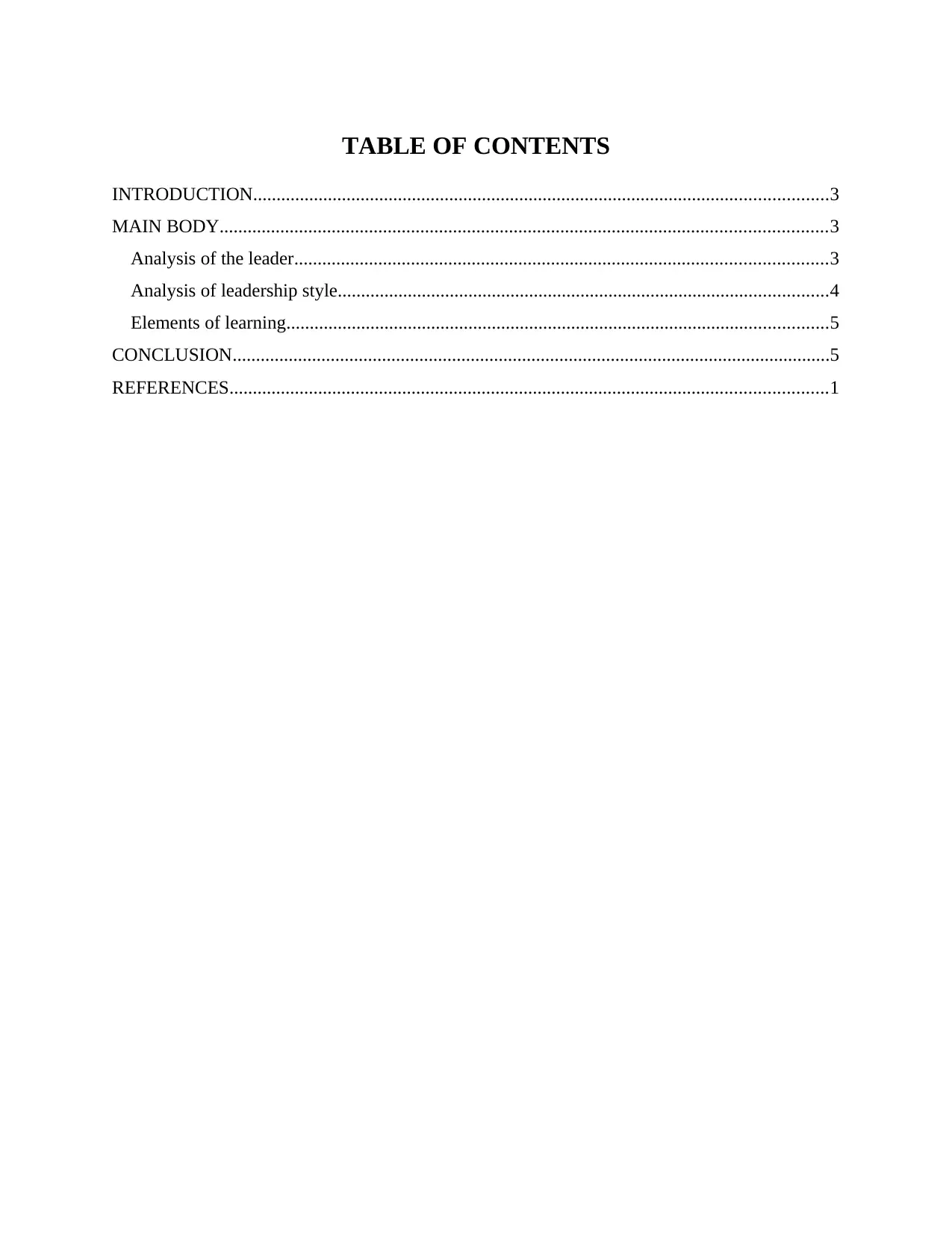
TABLE OF CONTENTS
INTRODUCTION...........................................................................................................................3
MAIN BODY..................................................................................................................................3
Analysis of the leader..................................................................................................................3
Analysis of leadership style.........................................................................................................4
Elements of learning....................................................................................................................5
CONCLUSION................................................................................................................................5
REFERENCES................................................................................................................................1
INTRODUCTION...........................................................................................................................3
MAIN BODY..................................................................................................................................3
Analysis of the leader..................................................................................................................3
Analysis of leadership style.........................................................................................................4
Elements of learning....................................................................................................................5
CONCLUSION................................................................................................................................5
REFERENCES................................................................................................................................1
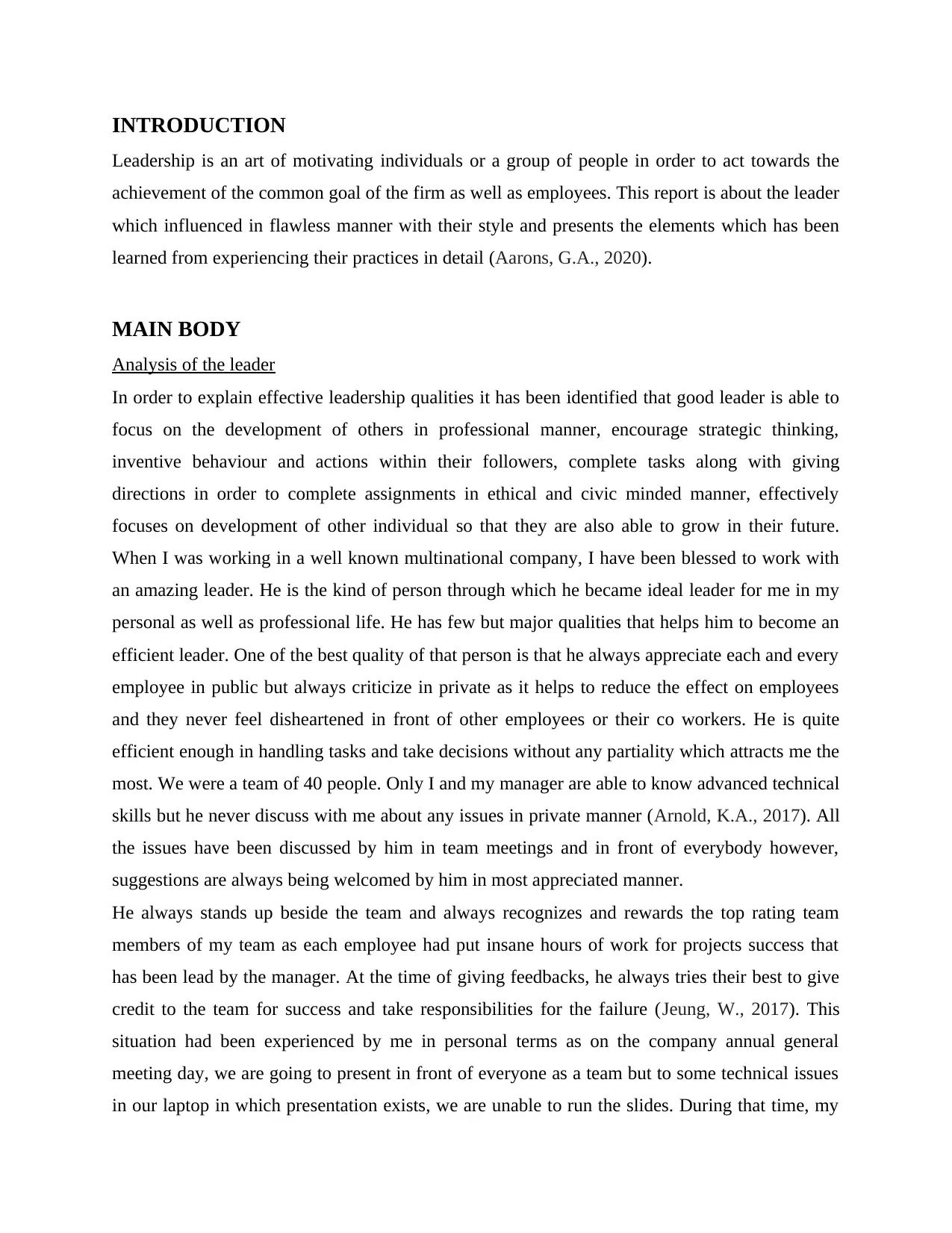
INTRODUCTION
Leadership is an art of motivating individuals or a group of people in order to act towards the
achievement of the common goal of the firm as well as employees. This report is about the leader
which influenced in flawless manner with their style and presents the elements which has been
learned from experiencing their practices in detail (Aarons, G.A., 2020).
MAIN BODY
Analysis of the leader
In order to explain effective leadership qualities it has been identified that good leader is able to
focus on the development of others in professional manner, encourage strategic thinking,
inventive behaviour and actions within their followers, complete tasks along with giving
directions in order to complete assignments in ethical and civic minded manner, effectively
focuses on development of other individual so that they are also able to grow in their future.
When I was working in a well known multinational company, I have been blessed to work with
an amazing leader. He is the kind of person through which he became ideal leader for me in my
personal as well as professional life. He has few but major qualities that helps him to become an
efficient leader. One of the best quality of that person is that he always appreciate each and every
employee in public but always criticize in private as it helps to reduce the effect on employees
and they never feel disheartened in front of other employees or their co workers. He is quite
efficient enough in handling tasks and take decisions without any partiality which attracts me the
most. We were a team of 40 people. Only I and my manager are able to know advanced technical
skills but he never discuss with me about any issues in private manner (Arnold, K.A., 2017). All
the issues have been discussed by him in team meetings and in front of everybody however,
suggestions are always being welcomed by him in most appreciated manner.
He always stands up beside the team and always recognizes and rewards the top rating team
members of my team as each employee had put insane hours of work for projects success that
has been lead by the manager. At the time of giving feedbacks, he always tries their best to give
credit to the team for success and take responsibilities for the failure (Jeung, W., 2017). This
situation had been experienced by me in personal terms as on the company annual general
meeting day, we are going to present in front of everyone as a team but to some technical issues
in our laptop in which presentation exists, we are unable to run the slides. During that time, my
Leadership is an art of motivating individuals or a group of people in order to act towards the
achievement of the common goal of the firm as well as employees. This report is about the leader
which influenced in flawless manner with their style and presents the elements which has been
learned from experiencing their practices in detail (Aarons, G.A., 2020).
MAIN BODY
Analysis of the leader
In order to explain effective leadership qualities it has been identified that good leader is able to
focus on the development of others in professional manner, encourage strategic thinking,
inventive behaviour and actions within their followers, complete tasks along with giving
directions in order to complete assignments in ethical and civic minded manner, effectively
focuses on development of other individual so that they are also able to grow in their future.
When I was working in a well known multinational company, I have been blessed to work with
an amazing leader. He is the kind of person through which he became ideal leader for me in my
personal as well as professional life. He has few but major qualities that helps him to become an
efficient leader. One of the best quality of that person is that he always appreciate each and every
employee in public but always criticize in private as it helps to reduce the effect on employees
and they never feel disheartened in front of other employees or their co workers. He is quite
efficient enough in handling tasks and take decisions without any partiality which attracts me the
most. We were a team of 40 people. Only I and my manager are able to know advanced technical
skills but he never discuss with me about any issues in private manner (Arnold, K.A., 2017). All
the issues have been discussed by him in team meetings and in front of everybody however,
suggestions are always being welcomed by him in most appreciated manner.
He always stands up beside the team and always recognizes and rewards the top rating team
members of my team as each employee had put insane hours of work for projects success that
has been lead by the manager. At the time of giving feedbacks, he always tries their best to give
credit to the team for success and take responsibilities for the failure (Jeung, W., 2017). This
situation had been experienced by me in personal terms as on the company annual general
meeting day, we are going to present in front of everyone as a team but to some technical issues
in our laptop in which presentation exists, we are unable to run the slides. During that time, my
⊘ This is a preview!⊘
Do you want full access?
Subscribe today to unlock all pages.

Trusted by 1+ million students worldwide
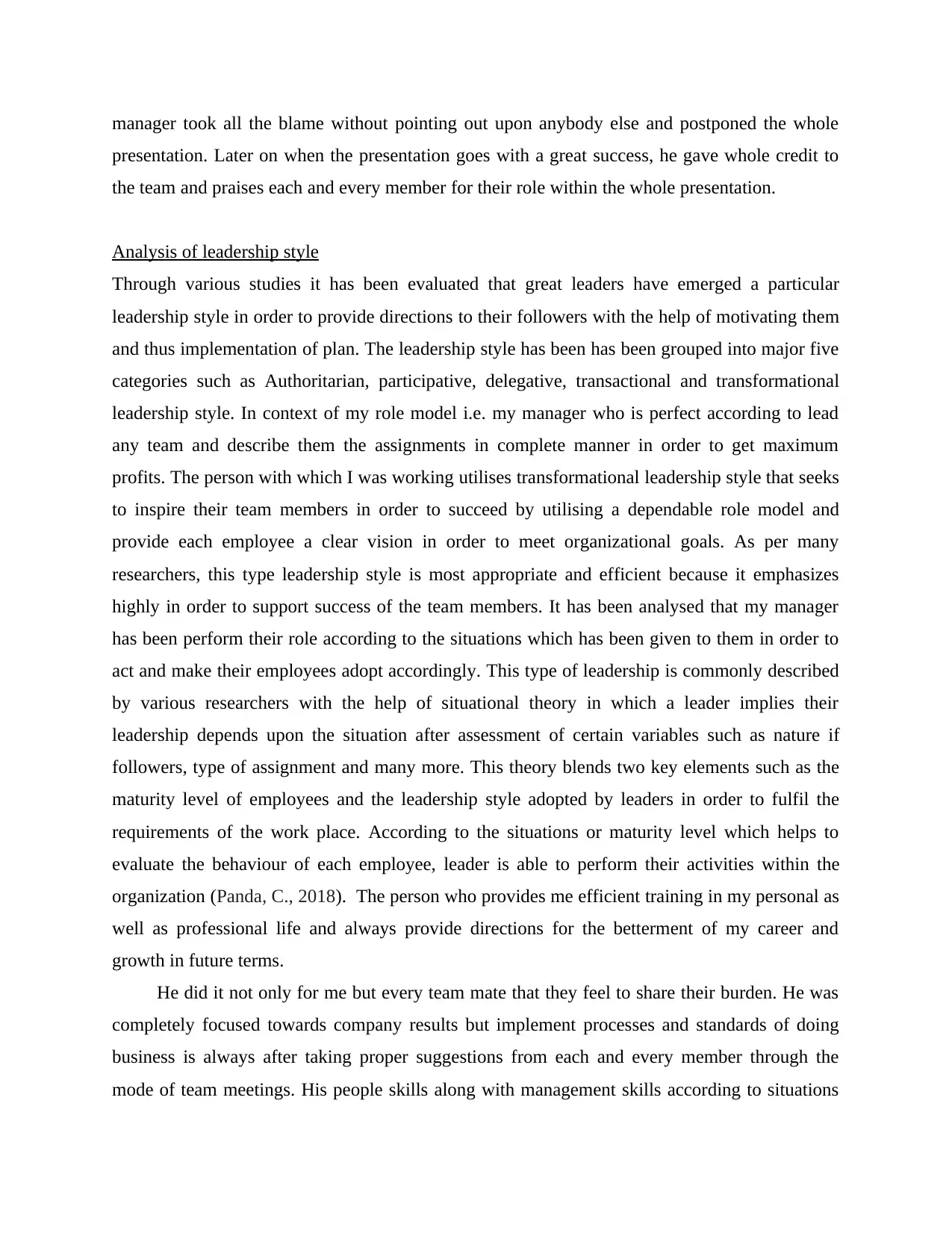
manager took all the blame without pointing out upon anybody else and postponed the whole
presentation. Later on when the presentation goes with a great success, he gave whole credit to
the team and praises each and every member for their role within the whole presentation.
Analysis of leadership style
Through various studies it has been evaluated that great leaders have emerged a particular
leadership style in order to provide directions to their followers with the help of motivating them
and thus implementation of plan. The leadership style has been has been grouped into major five
categories such as Authoritarian, participative, delegative, transactional and transformational
leadership style. In context of my role model i.e. my manager who is perfect according to lead
any team and describe them the assignments in complete manner in order to get maximum
profits. The person with which I was working utilises transformational leadership style that seeks
to inspire their team members in order to succeed by utilising a dependable role model and
provide each employee a clear vision in order to meet organizational goals. As per many
researchers, this type leadership style is most appropriate and efficient because it emphasizes
highly in order to support success of the team members. It has been analysed that my manager
has been perform their role according to the situations which has been given to them in order to
act and make their employees adopt accordingly. This type of leadership is commonly described
by various researchers with the help of situational theory in which a leader implies their
leadership depends upon the situation after assessment of certain variables such as nature if
followers, type of assignment and many more. This theory blends two key elements such as the
maturity level of employees and the leadership style adopted by leaders in order to fulfil the
requirements of the work place. According to the situations or maturity level which helps to
evaluate the behaviour of each employee, leader is able to perform their activities within the
organization (Panda, C., 2018). The person who provides me efficient training in my personal as
well as professional life and always provide directions for the betterment of my career and
growth in future terms.
He did it not only for me but every team mate that they feel to share their burden. He was
completely focused towards company results but implement processes and standards of doing
business is always after taking proper suggestions from each and every member through the
mode of team meetings. His people skills along with management skills according to situations
presentation. Later on when the presentation goes with a great success, he gave whole credit to
the team and praises each and every member for their role within the whole presentation.
Analysis of leadership style
Through various studies it has been evaluated that great leaders have emerged a particular
leadership style in order to provide directions to their followers with the help of motivating them
and thus implementation of plan. The leadership style has been has been grouped into major five
categories such as Authoritarian, participative, delegative, transactional and transformational
leadership style. In context of my role model i.e. my manager who is perfect according to lead
any team and describe them the assignments in complete manner in order to get maximum
profits. The person with which I was working utilises transformational leadership style that seeks
to inspire their team members in order to succeed by utilising a dependable role model and
provide each employee a clear vision in order to meet organizational goals. As per many
researchers, this type leadership style is most appropriate and efficient because it emphasizes
highly in order to support success of the team members. It has been analysed that my manager
has been perform their role according to the situations which has been given to them in order to
act and make their employees adopt accordingly. This type of leadership is commonly described
by various researchers with the help of situational theory in which a leader implies their
leadership depends upon the situation after assessment of certain variables such as nature if
followers, type of assignment and many more. This theory blends two key elements such as the
maturity level of employees and the leadership style adopted by leaders in order to fulfil the
requirements of the work place. According to the situations or maturity level which helps to
evaluate the behaviour of each employee, leader is able to perform their activities within the
organization (Panda, C., 2018). The person who provides me efficient training in my personal as
well as professional life and always provide directions for the betterment of my career and
growth in future terms.
He did it not only for me but every team mate that they feel to share their burden. He was
completely focused towards company results but implement processes and standards of doing
business is always after taking proper suggestions from each and every member through the
mode of team meetings. His people skills along with management skills according to situations
Paraphrase This Document
Need a fresh take? Get an instant paraphrase of this document with our AI Paraphraser
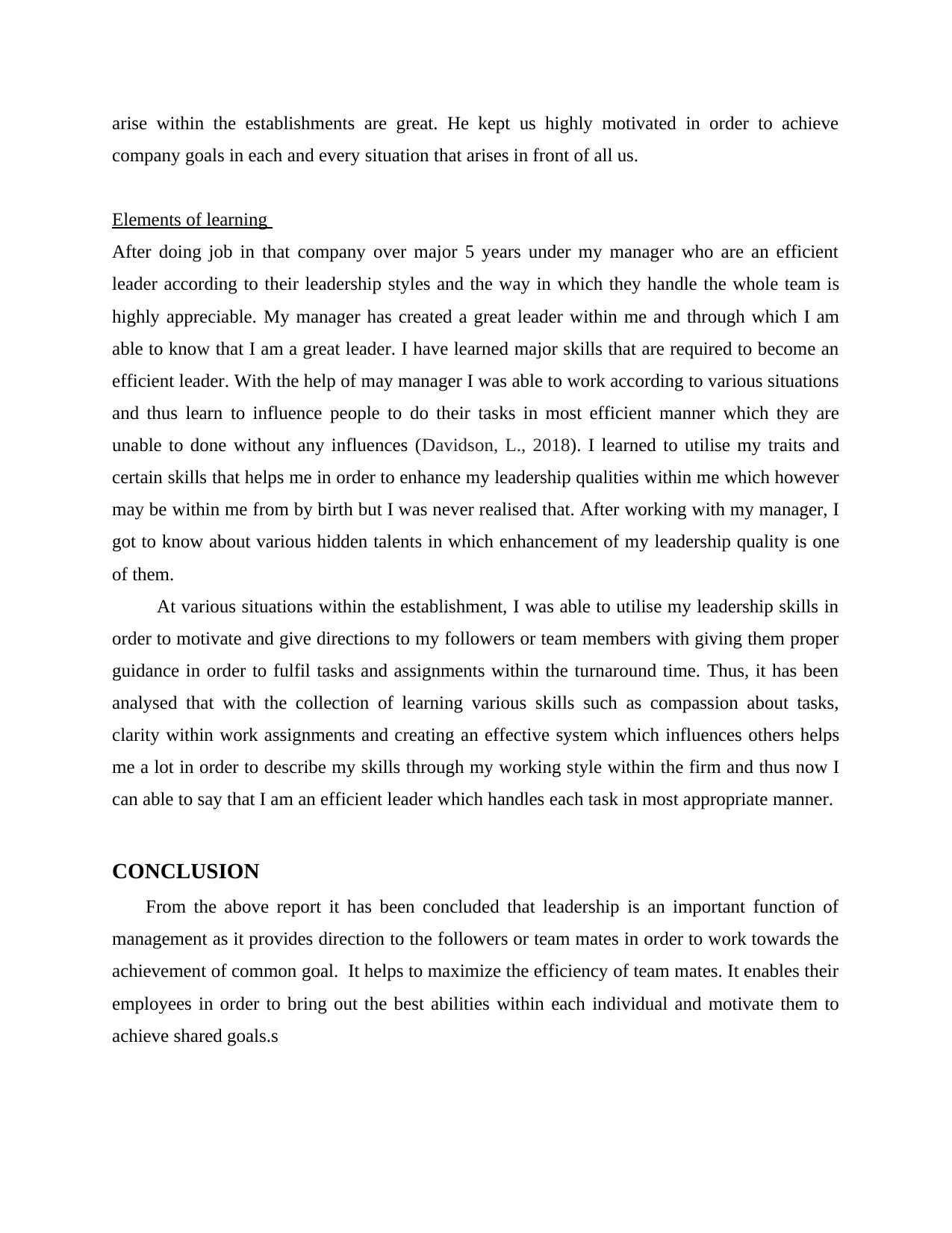
arise within the establishments are great. He kept us highly motivated in order to achieve
company goals in each and every situation that arises in front of all us.
Elements of learning
After doing job in that company over major 5 years under my manager who are an efficient
leader according to their leadership styles and the way in which they handle the whole team is
highly appreciable. My manager has created a great leader within me and through which I am
able to know that I am a great leader. I have learned major skills that are required to become an
efficient leader. With the help of may manager I was able to work according to various situations
and thus learn to influence people to do their tasks in most efficient manner which they are
unable to done without any influences (Davidson, L., 2018). I learned to utilise my traits and
certain skills that helps me in order to enhance my leadership qualities within me which however
may be within me from by birth but I was never realised that. After working with my manager, I
got to know about various hidden talents in which enhancement of my leadership quality is one
of them.
At various situations within the establishment, I was able to utilise my leadership skills in
order to motivate and give directions to my followers or team members with giving them proper
guidance in order to fulfil tasks and assignments within the turnaround time. Thus, it has been
analysed that with the collection of learning various skills such as compassion about tasks,
clarity within work assignments and creating an effective system which influences others helps
me a lot in order to describe my skills through my working style within the firm and thus now I
can able to say that I am an efficient leader which handles each task in most appropriate manner.
CONCLUSION
From the above report it has been concluded that leadership is an important function of
management as it provides direction to the followers or team mates in order to work towards the
achievement of common goal. It helps to maximize the efficiency of team mates. It enables their
employees in order to bring out the best abilities within each individual and motivate them to
achieve shared goals.s
company goals in each and every situation that arises in front of all us.
Elements of learning
After doing job in that company over major 5 years under my manager who are an efficient
leader according to their leadership styles and the way in which they handle the whole team is
highly appreciable. My manager has created a great leader within me and through which I am
able to know that I am a great leader. I have learned major skills that are required to become an
efficient leader. With the help of may manager I was able to work according to various situations
and thus learn to influence people to do their tasks in most efficient manner which they are
unable to done without any influences (Davidson, L., 2018). I learned to utilise my traits and
certain skills that helps me in order to enhance my leadership qualities within me which however
may be within me from by birth but I was never realised that. After working with my manager, I
got to know about various hidden talents in which enhancement of my leadership quality is one
of them.
At various situations within the establishment, I was able to utilise my leadership skills in
order to motivate and give directions to my followers or team members with giving them proper
guidance in order to fulfil tasks and assignments within the turnaround time. Thus, it has been
analysed that with the collection of learning various skills such as compassion about tasks,
clarity within work assignments and creating an effective system which influences others helps
me a lot in order to describe my skills through my working style within the firm and thus now I
can able to say that I am an efficient leader which handles each task in most appropriate manner.
CONCLUSION
From the above report it has been concluded that leadership is an important function of
management as it provides direction to the followers or team mates in order to work towards the
achievement of common goal. It helps to maximize the efficiency of team mates. It enables their
employees in order to bring out the best abilities within each individual and motivate them to
achieve shared goals.s
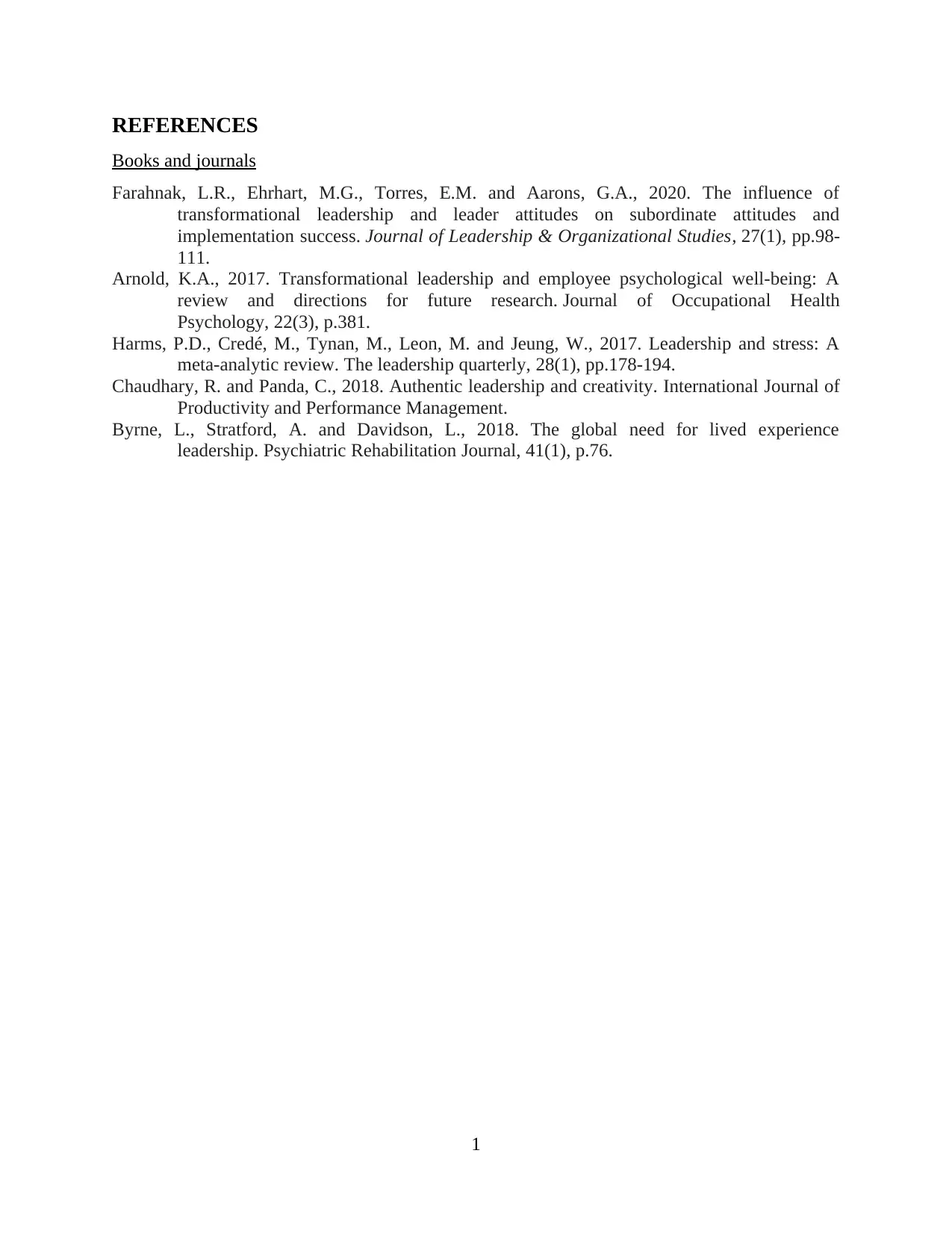
REFERENCES
Books and journals
Farahnak, L.R., Ehrhart, M.G., Torres, E.M. and Aarons, G.A., 2020. The influence of
transformational leadership and leader attitudes on subordinate attitudes and
implementation success. Journal of Leadership & Organizational Studies, 27(1), pp.98-
111.
Arnold, K.A., 2017. Transformational leadership and employee psychological well-being: A
review and directions for future research. Journal of Occupational Health
Psychology, 22(3), p.381.
Harms, P.D., Credé, M., Tynan, M., Leon, M. and Jeung, W., 2017. Leadership and stress: A
meta-analytic review. The leadership quarterly, 28(1), pp.178-194.
Chaudhary, R. and Panda, C., 2018. Authentic leadership and creativity. International Journal of
Productivity and Performance Management.
Byrne, L., Stratford, A. and Davidson, L., 2018. The global need for lived experience
leadership. Psychiatric Rehabilitation Journal, 41(1), p.76.
1
Books and journals
Farahnak, L.R., Ehrhart, M.G., Torres, E.M. and Aarons, G.A., 2020. The influence of
transformational leadership and leader attitudes on subordinate attitudes and
implementation success. Journal of Leadership & Organizational Studies, 27(1), pp.98-
111.
Arnold, K.A., 2017. Transformational leadership and employee psychological well-being: A
review and directions for future research. Journal of Occupational Health
Psychology, 22(3), p.381.
Harms, P.D., Credé, M., Tynan, M., Leon, M. and Jeung, W., 2017. Leadership and stress: A
meta-analytic review. The leadership quarterly, 28(1), pp.178-194.
Chaudhary, R. and Panda, C., 2018. Authentic leadership and creativity. International Journal of
Productivity and Performance Management.
Byrne, L., Stratford, A. and Davidson, L., 2018. The global need for lived experience
leadership. Psychiatric Rehabilitation Journal, 41(1), p.76.
1
⊘ This is a preview!⊘
Do you want full access?
Subscribe today to unlock all pages.

Trusted by 1+ million students worldwide
1 out of 6
Related Documents
Your All-in-One AI-Powered Toolkit for Academic Success.
+13062052269
info@desklib.com
Available 24*7 on WhatsApp / Email
![[object Object]](/_next/static/media/star-bottom.7253800d.svg)
Unlock your academic potential
Copyright © 2020–2026 A2Z Services. All Rights Reserved. Developed and managed by ZUCOL.




